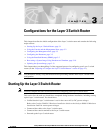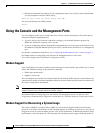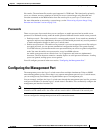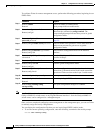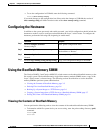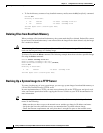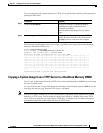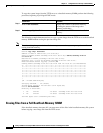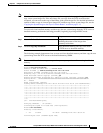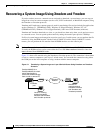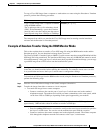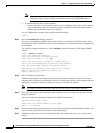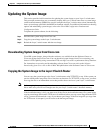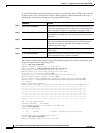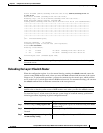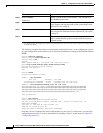
3-6
Catalyst 2948G-L3 and Catalyst 4908G-L3 Switch Router Software Feature and Configuration Guide
78-10408-03
Chapter 3 Configurations for the Layer 3 Switch Router
Using the Bootflash Memory SIMM
• To list the directory contents of any bootflash memory media, enter the dir [bootflash:] command.
Router# dir
Directory of bootflash:/
1 -rw- 3153784 <no date> cat2948g-in-mz.old
2 -rw- 3153932 <no date> cat2948g-in-mz
16777216 bytes total (7315372 bytes free)
Router#
Deleting Files from Bootflash Memory
When you delete a file from bootflash memory, the system marks the file as deleted. Deleted files cannot
be recovered. The bootflash memory is not released after the image file has been deleted; only the image
file is marked as deleted.
Caution When deleting files from memory, be careful not to delete all the system images. You should always
retain one known good image as a backup image.
To delete a file, enter the delete command. The following example shows how to delete a specified image
file using the delete command:
Router# delete cat2948g-in-mz.old
Delete filename [cat2948g-in-mz.old]?
Delete bootflash:cat2948g-in-mz.old? [confirm]
Router# dir
Directory of bootflash:/
2 -rw- 3153932 <no date> cat2948g-in-mz
16777216 bytes total (7315372 bytes free)
Backing Up a System Image to a TFTP Server
To create a backup copy of your system image, you can copy system images from bootflash memory to
a Trivial File Transfer Protocol (TFTP) server.
In some implementations of TFTP, you must create a dummy file on the TFTP server and give it read,
write, and execute permissions before copying the file over it. Refer to your TFTP documentation for
more information.
Tip Before you copy software between the network server and bootflash memory in the Layer 3 switch
router, do the following:
– Make sure that you have access to the network server and that you know its IP address and name.
– Verify that the server has sufficient room to accommodate the Cisco IOS software image.
– Check the filename requirements and verify that there is enough file space on the network server.



